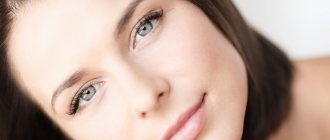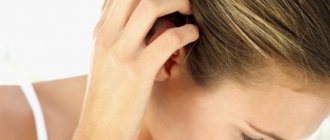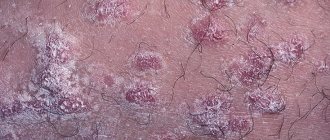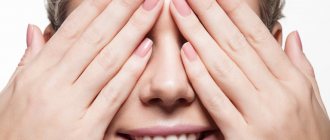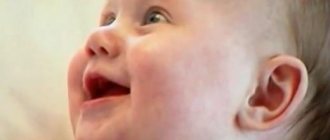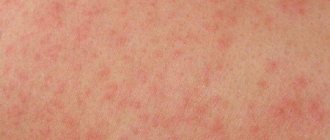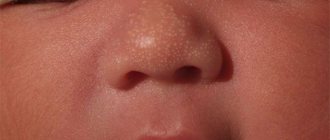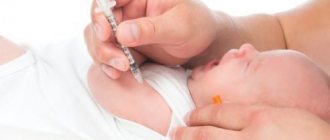Any changes in the condition of the baby can alert an inexperienced mother. For example, a lot of questions are raised by dense yellow crusts that often appear on a baby’s forehead, mainly affecting the eyebrows. It is not so easy to get rid of formations. Even during water procedures, they do not get wet to such an extent that they can be removed without harm to the child.
Before using various cosmetic products and folk remedies for this purpose, it is necessary to find out the cause of the condition and neutralize it. Only in this case the peeling will go away and will not return.
Causes of peeling skin in infants
The baby is born into the world covered with vernix. This is a special grayish substance that is formed during its intrauterine development. This is what makes it easier for the baby to pass through the birth canal.
Relatively recently, the baby was wiped after birth, completely cleansing the skin. Today, vernix is most often left to allow it to be absorbed into the baby's skin.
But even in this case, the child’s skin begins to peel off. Sometimes the process is so active that it scares the baby’s mother. Causes of peeling skin may include:
Adaptation of the child’s body to completely new conditions
After birth, the child is forced to adapt to survival in completely new conditions. This concerns not only the body, but also the skin of the baby. They come into contact with air, fabrics, diapers and the reaction can be completely different. But gradually everything returns to normal, and the skin becomes smooth. So if the baby has peeling, but the baby does not show signs of concern, then everything is normal and there is no reason to worry.
The air in the children's room is too dry
It is because of insufficient air humidity in the room where the child spends most of the day that peeling of the skin is observed. The norm is considered to be air humidity in the range of 55...70%. Only in such conditions will the baby be comfortable (the skin will be able to maintain the required level of moisture).
If the air in the room is not sufficiently humidified, you can bring a container of water into the room and let it evaporate freely. But it is very important to monitor the indicators, since too humid air is also not very good.
It is especially important to maintain an optimal level of air humidity on hot summer days and throughout the heating season.
Improper skin care for babies
A huge mistake for parents is regularly bathing their newborn baby in water with the addition of potassium permanganate, since such procedures dry out the surface of the skin quite strongly. Of course, this will be useful for healing the umbilical wound and preventing the addition of a secondary infection, but it is too much stress for the baby’s entire body.
A newborn should be bathed in settled, pre-boiled water without adding any herbal decoctions, as this may cause the child to develop an allergic reaction. Later, when the baby's skin adapts to the environment, herbal infusions can be used. It is also advisable to use baby soap no more than once a week, as it can also be very drying to the skin.
After bathing, you need to examine your child's skin. If rashes or flaky areas appear, you need to change the soap and shampoo used when bathing your baby. It is likely that this is a manifestation of an allergic reaction to these particular cosmetics.
Skin response to external factors
The skin of a newborn baby is very delicate and actively reacts to any irritation. Quite often, peeling of the skin occurs after the first walk, when the baby first encounters direct exposure to air. That is why until the adaptation process is completed, the baby must be protected from the effects of any natural factors.
Does it often happen that a baby's skin peels?
Let's put it this way: if you find a baby whose skin has never peeled off in the first year of life, you will surprise not only us, but, perhaps, all pediatricians in the world. In most cases, peeling is a completely natural process that is associated with a sharp change in environmental conditions. Sometimes the baby’s skin even peels off; especially problem areas for a newborn are the feet, hands, and head.
Just think about it: over the previous nine months, the child has never encountered a situation where the temperature around him differs from his own. His skin was constantly moisturized and never came into contact with air. Finally, she did not know sunlight and was not exposed to ultraviolet radiation for a second. Now you can imagine the mess your beloved baby got into when he decided to be born 
Typically, a baby's skin will peel because it needs time to adapt to life outside the womb. But there are other factors that lead to this problem.
| Our expert Polina Vasilyeva dermatologist |
| If a newborn's skin peels, this is a physiological phenomenon and is normal. This condition can occur about a day after the birth of the baby and lasts for 3–4 weeks. Despite the fact that this condition is considered normal, it is worth seeing a doctor to rule out congenital ichthyosis and other skin diseases. |
Why does the skin on a baby's body peel off?
The appearance of flaky areas on a child’s body is, in most cases, a reaction of the child’s body to a negative impact. That is why it is important to establish the true cause of such a deviation and, if necessary, take action.
Very often, prolonged peeling, accompanied by the appearance of redness, is caused by an allergic reaction or the development of diathesis. In addition, the condition can be provoked by gastrointestinal problems, viral or fungal infections.
And if the child’s well-being worsens and the baby’s negative symptoms increase, the baby should be shown to a pediatrician. After the tests, the baby will be prescribed treatment appropriate to the condition.
Should I see a doctor if my newborn's skin is peeling?
In this situation, you need to act the same way as in all others related to the baby’s health: it’s better to play it safe and go to the doctor one more time than to ignore your doubts and start a problem. In addition, there are several alarming symptoms that clearly indicate the need to consult a specialist:
- The baby is growing, but the peeling is not getting smaller.
- The skin began to peel unevenly, and one or more spots appeared on the baby’s body, where the problem manifested itself more acutely.
- The peeling increased sharply, especially if you did not introduce new foods into complementary foods, did not put new clothes on the baby, or changed anything in his life.
- Not only does the baby's skin peel, but there are also other symptoms of skin diseases - red spots or dots, itching, pimples, blisters and others.
| Our expert Polina Vasilyeva dermatologist |
| Initially, the skin of babies is practically never dry due to its saturation with lipids. But they dissolve under the influence of chemicals (which are found in washing powder, soap, and urine), so peeling and inflammation of the skin in babies is quite common. Dry skin can also become due to health problems, and therefore, if there is severe peeling, be sure to consult a doctor. |
Why does the skin on my baby's head peel?
Very often, the cause of the appearance of flaky areas on the scalp of a newborn baby is the development of seborrheic dermatitis. The condition can develop around the second or third month of a baby’s life and goes away without any treatment by the age of one year.
The development of seborrheic dermatitis is caused by the immaturity of the sweat and fat glands. It is the excessive production of sweat and sebum that causes flaking of the baby's scalp. By the end of the first year of life, the glands begin to function normally, and the symptoms of the disease gradually disappear.
But if the signs of seborrheic dermatitis persist even after the baby is one year old, then it is necessary to consult a specialist. It is likely that the child has pathologies of fat and sweat glands, disturbances in metabolic or endocrine processes.
Why does the skin on my child's eyebrows or forehead peel off?
The main reasons that can provoke peeling of the eyebrows and forehead are:
- exposure to adverse weather factors - sun rays, cold wind, frost;
- infection;
- allergic reaction.
To identify the true cause, it is necessary to analyze the following points:
- duration of peeling;
- the time of its occurrence.
It is quite possible that the period when peeling began occurred when a new dish was introduced into the diet of a baby or a nursing mother. Sometimes this is how the baby’s body reacts to drug treatment.
In any case, if symptoms persist for a long time, the child must be shown to a pediatrician. The specialist will give appropriate recommendations.
Besides this reason, why else does a newborn’s skin peel?
The skin of a baby is very delicate and thin. With the help of peeling, it can indicate a variety of problems - from uncomfortable external conditions that are easy to eliminate, to serious diseases that require competent treatment. We will tell you about the most common problems, but if you have any doubts, we recommend that you consult a doctor.
- Diapers
If ordinary clothing should simply not cause skin problems, diapers must also ensure that these problems do not arise from contact with secretions. Buy only high-quality diapers for newborns and change them at least every 3-4 hours.
Do not forget that even the best diaper will not be able to ensure the absence of flaking and redness if hygiene rules are not followed. When changing a diaper, thoroughly dry the baby's skin, lubricate the folds and let the baby's body breathe for a few minutes.
- Dry air
It is not easy for a baby’s skin to get used to the air, so it is necessary to maintain high humidity in the children’s room - about 50–70%. Buy a hygrometer (a device that measures air humidity) or a weather station with this function. If the device readings are constantly below the recommended level, install a humidifier in the child's room. You can also use traditional methods - wet towels on the radiator, basins of water near the crib, frequent wet cleaning. But with a special device, of course, it is much more convenient: you only need to periodically add water to it, the humidifier will do the rest itself.
Dry air also dries out the mucous membranes of the nose, which can cause breathing and sleep disturbances.
Our expert Polina Vasilyeva
dermatologist
Children's skin contains a large amount of moisture, many times more than that of an adult, but due to a number of physiological characteristics it loses water very easily. Drying out is fraught with the development of various dermatological problems. The baby's skin begins to peel off and becomes very sensitive to various external factors - high and low temperatures, dust, mechanical damage, sunlight and others. - Hygiene products
Some parents take their baby's hygiene very seriously. They buy various gels, shampoos, children's bubble baths and many other bathing products. All later, when the child grows up! At a tender age, these products do not help hygiene, but on the contrary, they can destroy the already fragile natural protection of the skin.
The baby should be bathed in regular tap water. Use shampoo and baby soap no more than once a week, and avoid all other products altogether. Do not add potassium permanganate to the bath - it dries it out and only aggravates the peeling problem.
Our expert Polina Vasilyeva
dermatologist
The child needs to select products specially designed for children’s skin with a good composition (without parabens, sodium lauryl sulfate, fragrances, etc.). - Improper care
The main task of caring for a child's skin is to ensure its hydration. For this, only two products are used - baby cream and baby oil; nothing else should be used. Don’t forget to thoroughly lubricate all the folds on the baby’s body, paying special attention to areas of peeling. And, of course, buy products only from reliable manufacturers and only in reputable stores.
It’s not common, but there are situations when some children’s cosmetics are not suitable for the child. When treating the baby’s skin, parents notice that the problems do not go away or even get worse. In such cases, it is recommended to change the product; in particular, you can try natural “edible” oils - olive, coconut, sesame and others.
Our expert Polina Vasilyeva
dermatologist
To moisturize the skin, it is important to ensure that the baby consumes a sufficient amount of fluid, especially if the body is actively losing it. For example, if a child experiences an intestinal disorder accompanied by vomiting, or has excessive sweating. - Wind, cold, sunlight
Does it ever happen that your face becomes chapped? Have you ever been sunburned? How does your skin feel after a long walk in the cold? Now imagine how all this affects the baby’s skin, which is several times thinner!
To prevent peeling in a newborn, protect exposed parts of his body from wind and direct sunlight. Try not to walk with him in open, windy spaces, choose a shady side of the street, use the stroller hood to protect the baby's skin. Before you start getting your baby ready for a walk in winter, lubricate his face with oil or a special cream. On sunny days, it is recommended to use sunscreen. Make sure the product is absorbed before going outside.
- Food allergies
If a baby's skin is peeling, this may be a manifestation of internal problems in the body, the most common of which is food allergies. At the complementary feeding stage, it is very important to follow the rule of sequential introduction of foods. After you have introduced the baby to a new taste, you need to wait a few days until the next menu expansion and observe possible negative reactions of the body. If you notice that your baby's skin is flaking more than before, it's most likely a new product.
If your baby is currently eating only mother's milk, carefully monitor your diet. Some allergens are able to pass through all the barriers of a woman’s digestive system and enter the milk, and from there into the baby’s body. Is your baby's skin peeling and the situation has suddenly gotten worse? Think about whether you've been on a diet lately.
Our expert Polina Vasilyeva
dermatologist
If the skin dries out due to an allergic reaction, the use of antihistamines is necessary (the specific drug is determined by the doctor). Parents need to ensure that the child does not have contact with the most common allergens - animal hair, dust, pollen, various chemicals, and also temporarily exclude allergenic foods from the diet. - Poor quality clothes
The baby's body is in contact with clothing almost all the time, and this can also be a source of the problem. Artificial fabrics, additives that give the material elasticity, durability and other properties, dyes - all this may not be liked by the skin of a newborn and may result in peeling.
It is advisable that all clothing that directly touches the baby’s body be natural. Buy it only in trusted stores - this guarantees the availability of the necessary hygiene certificates. And learn to confidently refuse an offer from your handicraft grandmother to sew a wonderful overall for your child from your old skirt.
- Detergents
Sometimes there are no harmful substances in the clothes themselves, but they come into them from washing powder, rinse aid, and stain remover. In this case, the baby's skin peels off all of his clothes at once.
If you notice that your problems have gotten worse and you've just recently switched to a new laundry detergent, don't use it anymore. And when buying in a store, choose products that say they are hypoallergenic and suitable for washing children's clothes.
Our expert Polina Vasilyeva
dermatologist
If peeling has already occurred, it is recommended, first of all, to recognize the real cause of its occurrence. If you suspect that peeling could have been caused by household chemicals or personal hygiene products, you need to replace them or eliminate them altogether. - Diapers
If ordinary clothing should simply not cause skin problems, diapers must also ensure that these problems do not arise from contact with secretions. Buy only high-quality diapers for newborns and change them at least every 3-4 hours.
Do not forget that even the best diaper will not be able to ensure the absence of flaking and redness if hygiene rules are not followed. When changing a diaper, thoroughly dry the baby's skin, lubricate the folds and let the baby's body breathe for a few minutes.
- Dry air
It is not easy for a baby’s skin to get used to the air, so it is necessary to maintain high humidity in the children’s room - about 50–70%. Buy a hygrometer (a device that measures air humidity) or a weather station with this function. If the device readings are constantly below the recommended level, install a humidifier in the child's room. You can also use traditional methods - wet towels on the radiator, basins of water near the crib, frequent wet cleaning. But with a special device, of course, it is much more convenient: you only need to periodically add water to it, the humidifier will do the rest itself.
Dry air also dries out the mucous membranes of the nose, which can cause breathing and sleep disturbances.
Our expert Polina Vasilyeva
dermatologist
Children's skin contains a large amount of moisture, many times more than that of an adult, but due to a number of physiological characteristics it loses water very easily. Drying out is fraught with the development of various dermatological problems. The baby's skin begins to peel off and becomes very sensitive to various external factors - high and low temperatures, dust, mechanical damage, sunlight and others.
